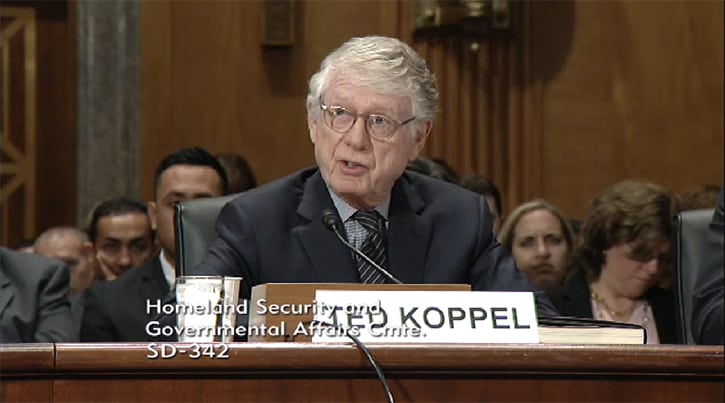Ted Koppel Says Chinese and Russians Are in U.S. Power Grid
Experts testifying during a Senate hearing on critical infrastructure security on May 18 were at odds about how vulnerable the electric grid is to a variety of threats.
“The Chinese are already in our power grid. The Russians are already inside our power grid. They may lack the motivation—because of the interrelationship that we have with both those governments—to take action against our grid, but they can do it,” said Ted Koppel, author of the book Lights Out: A Cyberattack, A Nation Unprepared, Surviving the Aftermath and former anchor of ABC’s late-night news program “Nightline.”
Koppel (Figure 1) was speaking to members of the U.S. Senate Committee on Homeland Security and Governmental Affairs during a hearing titled “Assessing the Security of Critical Infrastructure: Threat, Vulnerabilities, and Solutions.”
 |
1. Lights out. Ted Koppel testifies at a Senate hearing on critical infrastructure security on May 18. Courtesy: U.S. Senate Committee on Homeland Security & Governmental Affairs |
Threats to Power Grid Are Widespread
“We live in an age of cyberwarfare. Cyberwarfare is going on all the time on every different stage of our lives,” Koppel continued. “The fact that the governments like North Korea for example—which are desperately seeking the same kind of cyber sophistication that the Russians and the Chinese have—the fact that they don’t yet have it shouldn’t be the source of any particular comfort to us.”
Scott Aaronson, managing director of Cyber and Infrastructure Security for the Edison Electric Institute, who also testified before the committee, admitted that there is a problem, but he suggested “movie script scenarios” aren’t helpful. He said public policy must be developed in a reasonable and rational way.
“We do take this seriously. We do understand the threats that exist out there,” Aaronson said. “Up to and including the CEO level, security of the electric grid is a priority for this industry.”
Sen. Heidi Heitkamp (D-N.D.) said that high-tech threats are not all that the industry should be worried about. She suggested that people with knowledge of the grid could do a lot of damage through a coordinated attack, using just high-powered rifles.
Aaronson said that although there are 45,000 substations in the U.S.—which are the “definition” of soft targets—the system is exceedingly resilient and redundant, with a lot of excess capacity.
“I can tell you this,” said Aaronson. “We are sufficiently spared.”
Collapse of Electric Grid Could be Disastrous
Major General Donald P. Dunbar, adjutant general for the state of Wisconsin, suggested that the stakes are very high. If power were out for an extended period of time, he said it would be “a bad day, a bad week, a bad month in America.”
The dire consequences of an extended power grid outage have not been lost on Koppel. He implied that the U.S. is woefully ill-prepared to feed its population if an event took even part of the grid down.
“In a state like New York for example, you have 17 million people in the state. They have, let’s say, 20 or 30 million MREs [meal, ready-to-eat] stored in New York State. Do the math,” Koppel said.
But Aaronson believes the likelihood of such a high-impact event is improbable. “This is not happening tomorrow,” he said. Aaronson also noted that the industry has been taking steps to address the various threats.
“The industry is well underway in, not just investigating, but in some cases investing in mitigation,” Aaronson said. “As companies build new control centers, as companies are building new substations and new control housing, they are doing things to shield against EMP [electromagnetic pulse].”
Senate Homeland Security hearing; EEI witness says squirrels cause electric grid outages, more than nation states.
— Resilient Societies (@ResilientGrid) May 18, 2016
Aaronson offered other examples of initiatives, such as a spare transformer equipment program, which have reduced risk of extended power outages. But he suggested that it is impractical to guard against every possibility.
“To try to protect everything from everything is a fool’s errand,” Aaronson said. “What we need to do is continue to build that capacity to be responsive and redundant when things happen.”
—Aaron Larson, associate editor (@AaronL_Power, @POWERmagazine)